diff options
Diffstat (limited to 'src/collectors/systemd-journal.plugin/README.md')
| -rw-r--r-- | src/collectors/systemd-journal.plugin/README.md | 472 |
1 files changed, 472 insertions, 0 deletions
diff --git a/src/collectors/systemd-journal.plugin/README.md b/src/collectors/systemd-journal.plugin/README.md new file mode 100644 index 000000000..9f73ba30e --- /dev/null +++ b/src/collectors/systemd-journal.plugin/README.md @@ -0,0 +1,472 @@ + +# `systemd` journal plugin + +[KEY FEATURES](#key-features) | [JOURNAL SOURCES](#journal-sources) | [JOURNAL FIELDS](#journal-fields) | +[PLAY MODE](#play-mode) | [FULL TEXT SEARCH](#full-text-search) | [PERFORMANCE](#query-performance) | +[CONFIGURATION](#configuration-and-maintenance) | [FAQ](#faq) + +The `systemd` journal plugin by Netdata makes viewing, exploring and analyzing `systemd` journal logs simple and +efficient. +It automatically discovers available journal sources, allows advanced filtering, offers interactive visual +representations and supports exploring the logs of both individual servers and the logs on infrastructure wide +journal centralization servers. + +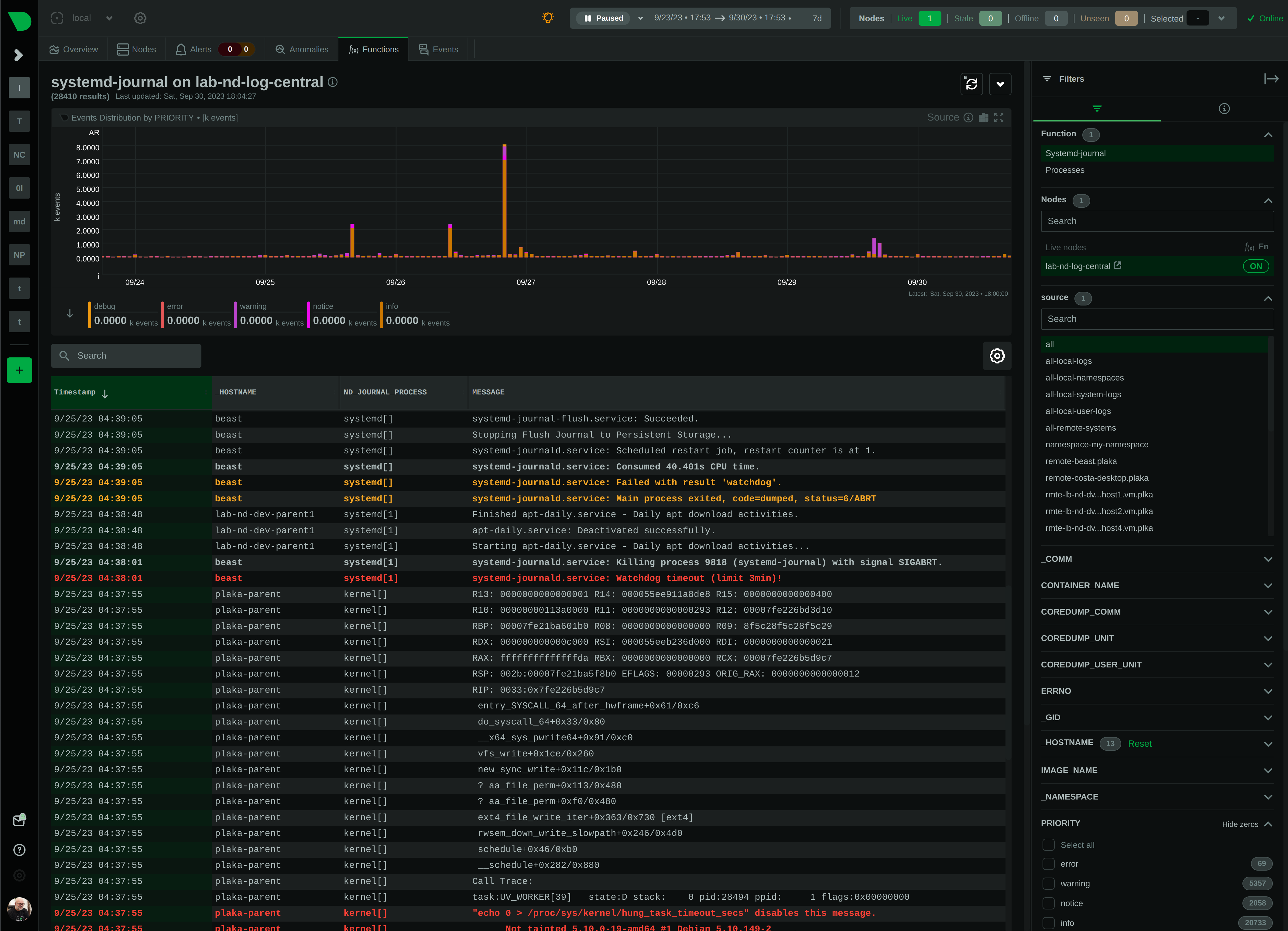 + +## Key features + +- Works on both **individual servers** and **journal centralization servers**. +- Supports `persistent` and `volatile` journals. +- Supports `system`, `user`, `namespaces` and `remote` journals. +- Allows filtering on **any journal field** or **field value**, for any time-frame. +- Allows **full text search** (`grep`) on all journal fields, for any time-frame. +- Provides a **histogram** for log entries over time, with a break down per field-value, for any field and any + time-frame. +- Works directly on journal files, without any other third-party components. +- Supports coloring log entries, the same way `journalctl` does. +- In PLAY mode provides the same experience as `journalctl -f`, showing new log entries immediately after they are + received. + +### Prerequisites + +`systemd-journal.plugin` is a Netdata Function Plugin. + +To protect your privacy, as with all Netdata Functions, a free Netdata Cloud user account is required to access it. +For more information check [this discussion](https://github.com/netdata/netdata/discussions/16136). + +### Limitations + +#### Plugin availability + +The following are limitations related to the availability of the plugin: + +- Netdata versions prior to 1.44 shipped in a docker container do not include this plugin. + The problem is that `libsystemd` is not available in Alpine Linux (there is a `libsystemd`, but it is a dummy that + returns failure on all calls). Starting with Netdata version 1.44, Netdata containers use a Debian base image + making this plugin available when Netdata is running in a container. +- For the same reason (lack of `systemd` support for Alpine Linux), the plugin is not available on `static` builds of + Netdata (which are based on `muslc`, not `glibc`). If your Netdata is installed in `/opt/netdata` you most likely have + a static build of Netdata. +- On old systemd systems (like Centos 7), the plugin runs always in "full data query" mode, which makes it slower. The + reason, is that systemd API is missing some important calls we need to use the field indexes of `systemd` journal. + However, when running in this mode, the plugin offers also negative matches on the data (like filtering for all logs + that do not have set some field), and this is the reason "full data query" mode is also offered as an option even on + newer versions of `systemd`. + +#### `systemd` journal features + +The following are limitations related to the features of `systemd` journal: + +- This plugin assumes that binary field values are text fields with newlines in them. `systemd-journal` has the ability + to support binary fields, without specifying the nature of the binary data. However, binary fields are commonly used + to store log entries that include multiple lines of text. The plugin treats all binary fields are multi-line text. +- This plugin does not support multiple values per field for any given log entry. `systemd` journal has the ability to + accept the same field key, multiple times, with multiple values on a single log entry. This plugin will present the + last value and ignore the others for this log entry. +- This plugin will only read journal files located in `/var/log/journal` or `/run/log/journal`. `systemd-journal-remote` has the + ability to store journal files anywhere (user configured). If journal files are not located in `/var/log/journal` + or `/run/log/journal` (and any of their subdirectories), the plugin will not find them. A simple solution is to link + the other directories somewhere inside `/var/log/journal`. The plugin will pick them up, even if a sub-directory of + `/var/log/journal` is a link to a directory outside `/var/log/journal`. + +Other than the above, this plugin supports all features of `systemd` journals. + +## Journal Sources + +The plugin automatically detects the available journal sources, based on the journal files available in +`/var/log/journal` (persistent logs) and `/run/log/journal` (volatile logs). + +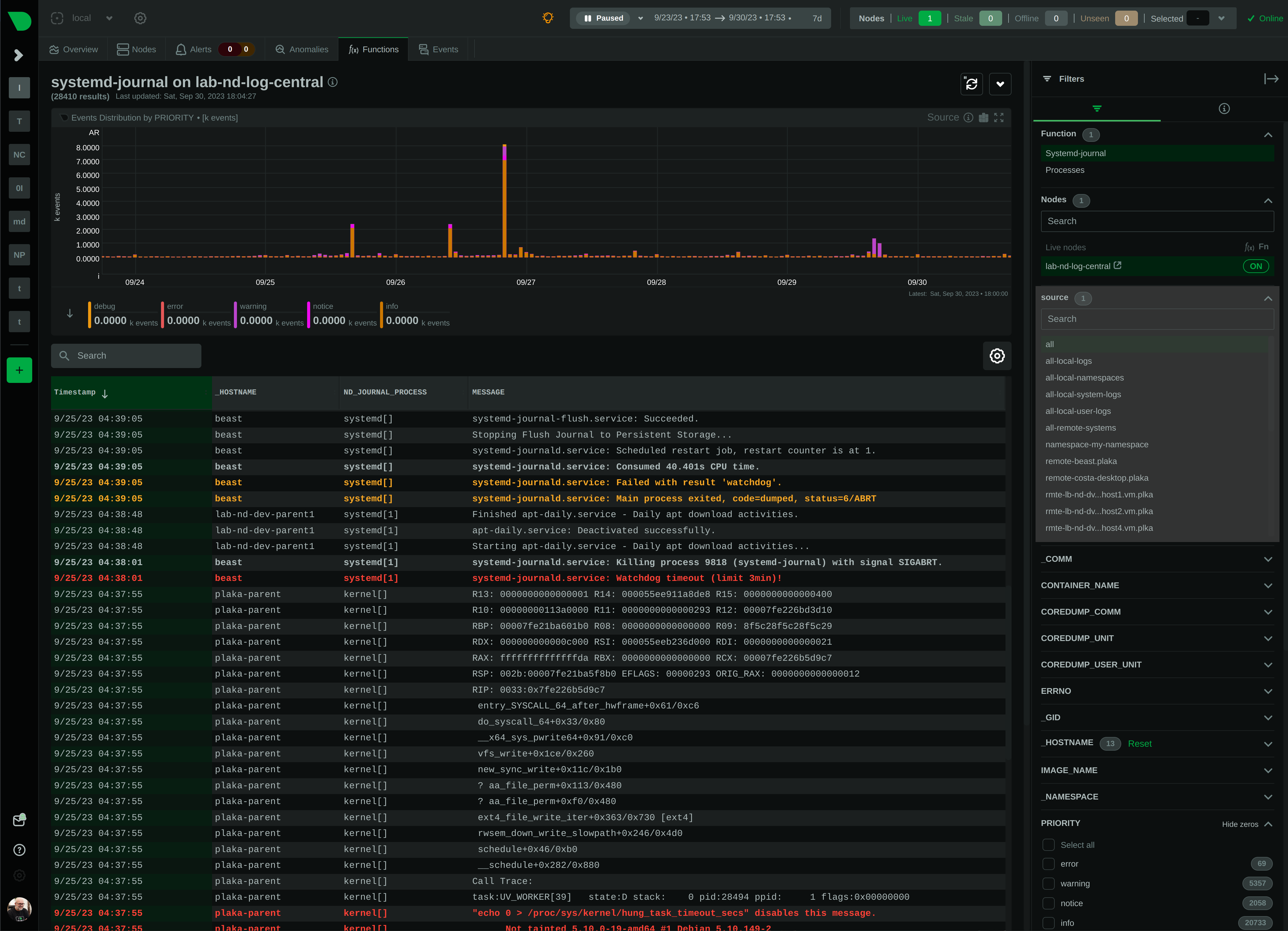 + +The plugin, by default, merges all journal sources together, to provide a unified view of all log messages available. + +> To improve query performance, we recommend selecting the relevant journal source, before doing more analysis on the +> logs. + +### `system` journals + +`system` journals are the default journals available on all `systemd` based systems. + +`system` journals contain: + +- kernel log messages (via `kmsg`), +- audit records, originating from the kernel audit subsystem, +- messages received by `systemd-journald` via `syslog`, +- messages received via the standard output and error of service units, +- structured messages received via the native journal API. + +### `user` journals + +Unlike `journalctl`, the Netdata plugin allows viewing, exploring and querying the journal files of **all users**. + +By default, each user, with a UID outside the range of system users (0 - 999), dynamic service users, +and the nobody user (65534), will get their own set of `user` journal files. For more information about +this policy check [Users, Groups, UIDs and GIDs on systemd Systems](https://systemd.io/UIDS-GIDS/). + +Keep in mind that `user` journals are merged with the `system` journals when they are propagated to a journal +centralization server. So, at the centralization server, the `remote` journals contain both the `system` and `user` +journals of the sender. + +### `namespaces` journals + +The plugin auto-detects the namespaces available and provides a list of all namespaces at the "sources" list on the UI. + +Journal namespaces are both a mechanism for logically isolating the log stream of projects consisting +of one or more services from the rest of the system and a mechanism for improving performance. + +`systemd` service units may be assigned to a specific journal namespace through the `LogNamespace=` unit file setting. + +Keep in mind that namespaces require special configuration to be propagated to a journal centralization server. +This makes them a little more difficult to handle, from the administration perspective. + +### `remote` journals + +Remote journals are created by `systemd-journal-remote`. This `systemd` feature allows creating logs centralization +points within your infrastructure, based exclusively on `systemd`. + +Usually `remote` journals are named by the IP of the server sending these logs. The Netdata plugin automatically +extracts these IPs and performs a reverse DNS lookup to find their hostnames. When this is successful, +`remote` journals are named by the hostnames of the origin servers. + +For information about configuring a journal centralization server, +check [this FAQ item](#how-do-i-configure-a-journal-centralization-server). + +## Journal Fields + +`systemd` journals are designed to support multiple fields per log entry. The power of `systemd` journals is that, +unlike other log management systems, it supports dynamic and variable fields for each log message, +while all fields and their values are indexed for fast querying. + +This means that each application can log messages annotated with its own unique fields and values, and `systemd` +journals will automatically index all of them, without any configuration or manual action. + +For a description of the most frequent fields found in `systemd` journals, check `man systemd.journal-fields`. + +Fields found in the journal files are automatically added to the UI in multiple places to help you explore +and filter the data. + +The plugin automatically enriches certain fields to make them more user-friendly: + +- `_BOOT_ID`: the hex value is annotated with the timestamp of the first message encountered for this boot id. +- `PRIORITY`: the numeric value is replaced with the human-readable name of each priority. +- `SYSLOG_FACILITY`: the encoded value is replaced with the human-readable name of each facility. +- `ERRNO`: the numeric value is annotated with the short name of each value. +- `_UID` `_AUDIT_LOGINUID`, `_SYSTEMD_OWNER_UID`, `OBJECT_UID`, `OBJECT_SYSTEMD_OWNER_UID`, `OBJECT_AUDIT_LOGINUID`: + the local user database is consulted to annotate them with usernames. +- `_GID`, `OBJECT_GID`: the local group database is consulted to annotate them with group names. +- `_CAP_EFFECTIVE`: the encoded value is annotated with a human-readable list of the linux capabilities. +- `_SOURCE_REALTIME_TIMESTAMP`: the numeric value is annotated with human-readable datetime in UTC. +- `MESSAGE_ID`: for the known `MESSAGE_ID`s, the value is replaced with the well known name of the event. + +The values of all other fields are presented as found in the journals. + +> IMPORTANT: +> The UID and GID annotations are added during presentation and are taken from the server running the plugin. +> For `remote` sources, the names presented may not reflect the actual user and group names on the origin server. +> The numeric value will still be visible though, as-is on the origin server. + +The annotations are not searchable with full-text search. They are only added for the presentation of the fields. + +### Journal fields as columns in the table + +All journal fields available in the journal files are offered as columns on the UI. Use the gear button above the table: + +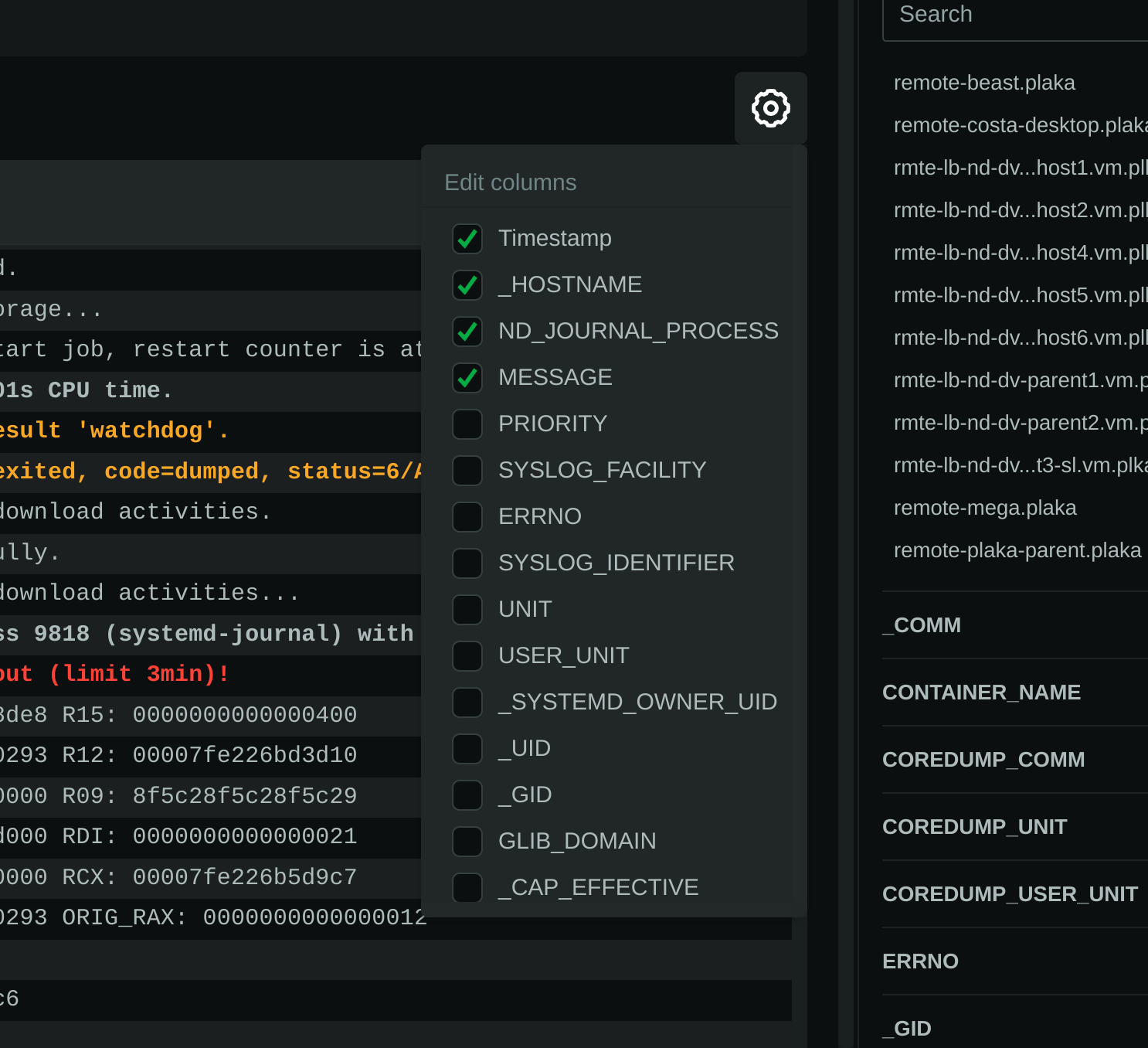 + +### Journal fields as additional info to each log entry + +When you click a log line, the `info` sidebar will open on the right of the screen, to provide the full list of fields +related to this log line. You can close this `info` sidebar, by selecting the filter icon at its top. + +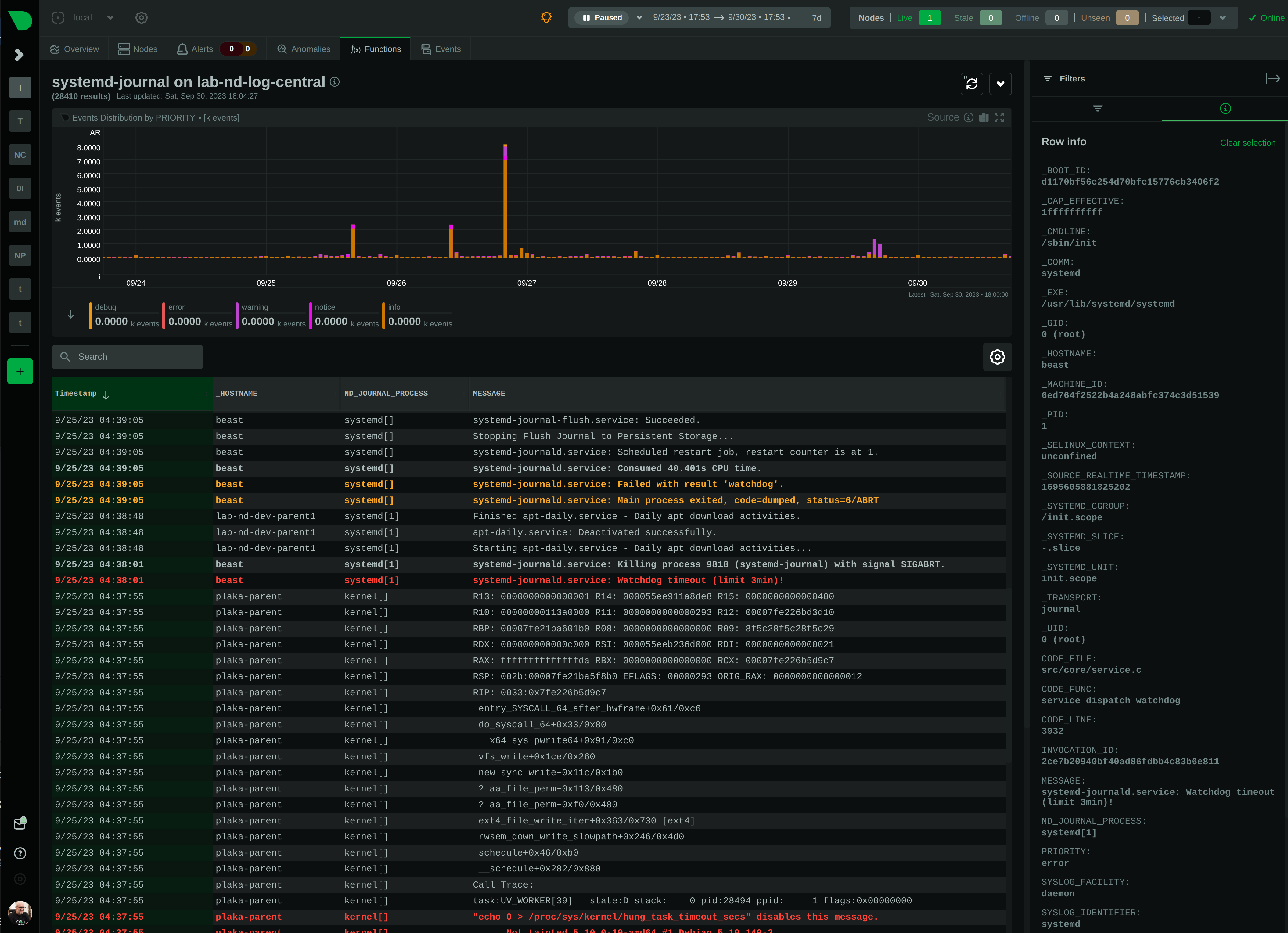 + +### Journal fields as filters + +The plugin presents a select list of fields as filters to the query, with counters for each of the possible values +for the field. This list can used to quickly check which fields and values are available for the entire time-frame +of the query. + +Internally the plugin has: + +1. A white-list of fields, to be presented as filters. +2. A black-list of fields, to prevent them from becoming filters. This list includes fields with a very high + cardinality, like timestamps, unique message ids, etc. This is mainly for protecting the server's performance, + to avoid building in memory indexes for the fields that almost each of their values is unique. + +Keep in mind that the values presented in the filters, and their sorting is affected by the "full data queries" +setting: + +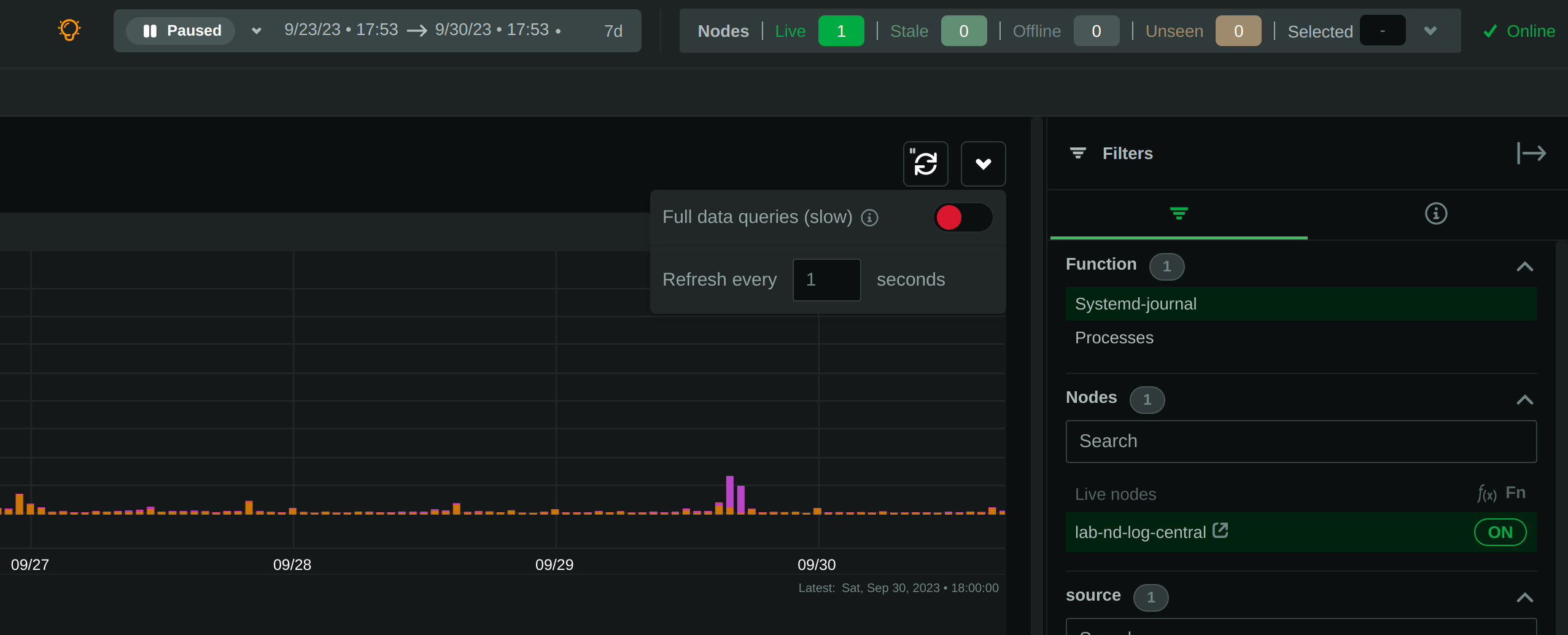 + +When "full data queries" is off, empty values are hidden and cannot be selected. This is due to a limitation of +`libsystemd` that does not allow negative or empty matches. Also, values with zero counters may appear in the list. + +When "full data queries" is on, Netdata is applying all filtering to the data (not `libsystemd`), but this means +that all the data of the entire time-frame, without any filtering applied, have to be read by the plugin to prepare +the response required. So, "full data queries" can be significantly slower over long time-frames. + +### Journal fields as histogram sources + +The plugin presents a histogram of the number of log entries across time. + +The data source of this histogram can be any of the fields that are available as filters. +For each of the values this field has, across the entire time-frame of the query, the histogram will get corresponding +dimensions, showing the number of log entries, per value, over time. + +The granularity of the histogram is adjusted automatically to have about 150 columns visible on screen. + +The histogram presented by the plugin is interactive: + +- **Zoom**, either with the global date-time picker, or the zoom tool in the histogram's toolbox. +- **Pan**, either with global date-time picker, or by dragging with the mouse the chart to the left or the right. +- **Click**, to quickly jump to the highlighted point in time in the log entries. + +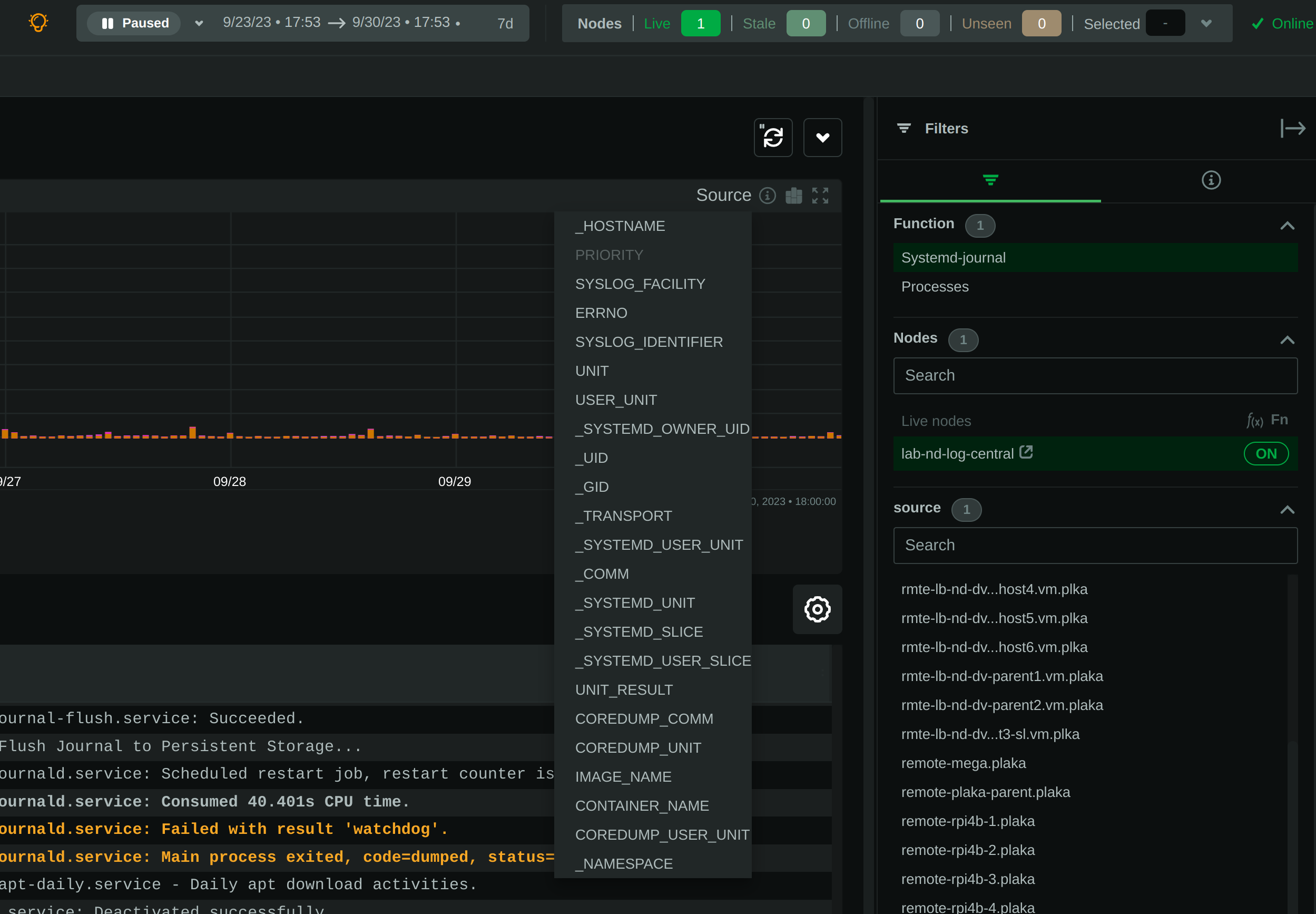 + +## PLAY mode + +The plugin supports PLAY mode, to continuously update the screen with new log entries found in the journal files. +Just hit the "play" button at the top of the Netdata dashboard screen. + +On centralized log servers, PLAY mode provides a unified view of all the new logs encountered across the entire +infrastructure, +from all hosts sending logs to the central logs server via `systemd-remote`. + +## Full-text search + +The plugin supports searching for any text on all fields of the log entries. + +Full text search is combined with the selected filters. + +The text box accepts asterisks `*` as wildcards. So, `a*b*c` means match anything that contains `a`, then `b` and +then `c` with anything between them. + +Spaces are treated as OR expressions. So that `a*b c*d` means `a*b OR c*d`. + +Negative expressions are supported, by prefixing any string with `!`. Example: `!systemd *` means match anything that +does not contain `systemd` on any of its fields. + +## Query performance + +Journal files are designed to be accessed by multiple readers and one writer, concurrently. + +Readers (like this Netdata plugin), open the journal files and `libsystemd`, behind the scenes, maps regions +of the files into memory, to satisfy each query. + +On logs aggregation servers, the performance of the queries depend on the following factors: + +1. The **number of files** involved in each query. + + This is why we suggest to select a source when possible. + +2. The **speed of the disks** hosting the journal files. + + Journal files perform a lot of reading while querying, so the fastest the disks, the faster the query will finish. + +3. The **memory available** for caching parts of the files. + + Increased memory will help the kernel cache the most frequently used parts of the journal files, avoiding disk I/O + and speeding up queries. + +4. The **number of filters** applied. + + Queries are significantly faster when just a few filters are selected. + +In general, for a faster experience, **keep a low number of rows within the visible timeframe**. + +Even on long timeframes, selecting a couple of filters that will result in a **few dozen thousand** log entries +will provide fast / rapid responses, usually less than a second. To the contrary, viewing timeframes with **millions +of entries** may result in longer delays. + +The plugin aborts journal queries when your browser cancels inflight requests. This allows you to work on the UI +while there are background queries running. + +At the time of this writing, this Netdata plugin is about 25-30 times faster than `journalctl` on queries that access +multiple journal files, over long time-frames. + +During the development of this plugin, we submitted, to `systemd`, a number of patches to improve `journalctl` +performance by a factor of 14: + +- <https://github.com/systemd/systemd/pull/29365> +- <https://github.com/systemd/systemd/pull/29366> +- <https://github.com/systemd/systemd/pull/29261> + +However, even after these patches are merged, `journalctl` will still be 2x slower than this Netdata plugin, +on multi-journal queries. + +The problem lies in the way `libsystemd` handles multi-journal file queries. To overcome this problem, +the Netdata plugin queries each file individually and it then it merges the results to be returned. +This is transparent, thanks to the `facets` library in `libnetdata` that handles on-the-fly indexing, filtering, +and searching of any dataset, independently of its source. + +## Performance at scale + +On busy logs servers, or when querying long timeframes that match millions of log entries, the plugin has a sampling +algorithm to allow it respond promptly. It works like this: + +1. The latest 500k log entries are queried in full, evaluating all the fields of every single log entry. This evaluation + allows counting the unique values per field, updating the counters next to each value at the filters section of the + dashboard. +2. When the latest 500k log entries have been processed and there are more data to read, the plugin divides evenly 500k + more log entries to the number of journal files matched by the query. So, it will continue to evaluate all the fields + of all log entries, up to the budget per file, aiming to fully query 1 million log entries in total. +3. When the budget is hit for a given file, the plugin continues to scan log entries, but this time it does not evaluate + the fields and their values, so the counters per field and value are not updated. These unsampled log entries are + shown in the histogram with the label `[unsampled]`. +4. The plugin continues to count `[unsampled]` entries until as many as sampled entries have been evaluated and at least + 1% of the journal file has been processed. +5. When the `[unsampled]` budget is exhausted, the plugin stops processing the journal file and based on the processing + completed so far and the number of entries in the journal file, it estimates the remaining number of log entries in + that file. This is shown as `[estimated]` at the histogram. +6. In systemd versions 254 or later, the plugin fetches the unique sequence number of each log entry and calculates the + the percentage of the file matched by the query, versus the total number of the log entries in the journal file. +7. In systemd versions prior to 254, the plugin estimates the number of entries the journal file contributes to the + query, using the amount of log entries matched it vs. the total duration the log file has entries for. + +The above allow the plugin to respond promptly even when the number of log entries in the journal files is several +dozens millions, while providing accurate estimations of the log entries over time at the histogram and enough counters +at the fields filtering section to help users get an overview of the whole timeframe. + +The fact that the latest 500k log entries and 1% of all journal files (which are spread over time) have been fully +evaluated, including counting the number of appearances for each field value, the plugin usually provides an accurate +representation of the whole timeframe. + +Keep in mind that although the plugin is quite effective and responds promptly when there are hundreds of journal files +matching a query, response times may be longer when there are several thousands of smaller files. systemd versions 254+ +attempt to solve this problem by allowing `systemd-journal-remote` to create larger files. However, for systemd +versions prior to 254, `systemd-journal-remote` creates files of up to 32MB each, which when running very busy +journals centralization servers aggregating several thousands of log entries per second, the number of files can grow +to several dozens of thousands quickly. In such setups, the plugin should ideally skip processing journal files +entirely, relying solely on the estimations of the sequence of files each file is part of. However, this has not been +implemented yet. To improve the query performance in such setups, the user has to query smaller timeframes. + +Another optimization taking place in huge journal centralization points, is the initial scan of the database. The plugin +needs to know the list of all journal files available, including the details of the first and the last message in each +of them. When there are several thousands of files in a directory (like it usually happens in `/var/log/journal/remote`), +directory listing and examination of each file can take a considerable amount of time (even `ls -l` takes minutes). +To work around this problem, the plugin uses `inotify` to receive file updates immediately and scans the library from +the newest to the oldest file, allowing the user interface to work immediately after startup, for the most recent +timeframes. + +### Best practices for better performance + +systemd-journal has been designed **first to be reliable** and then to be fast. It includes several mechanisms to ensure +minimal data loss under all conditions (e.g. disk corruption, tampering, forward secure sealing) and despite the fact +that it utilizes several techniques to require minimal disk footprint (like deduplication of log entries, linking of +values and fields, compression) the disk footprint of journal files remains significantly higher compared to other log +management solutions. + +The higher disk footprint results in higher disk I/O during querying, since a lot more data have to read from disk to +evaluate a query. Query performance at scale can greatly benefit by utilizing a compressed filesystem (ext4, btrfs, zfs) +to store systemd-journal files. + +systemd-journal files are cached by the operating system. There is no database server to serve queries. Each file is +opened and the query runs by directly accessing the data in it. + +Therefore systemd-journal relies on the caching layer of the operating system to optimize query performance. The more +RAM the system has, although it will not be reported as `used` (it will be reported as `cache`), the faster the queries +will get. The first time a timeframe is accessed the query performance will be slower, but further queries on the same +timeframe will be significantly faster since journal data are now cached in memory. + +So, on busy logs centralization systems, queries performance can be improved significantly by using a compressed +filesystem for storing the journal files, and higher amounts of RAM. + +## Configuration and maintenance + +This Netdata plugin does not require any configuration or maintenance. + +## FAQ + +### Can I use this plugin on journal centralization servers? + +Yes. You can centralize your logs using `systemd-journal-remote`, and then install Netdata +on this logs centralization server to explore the logs of all your infrastructure. + +This plugin will automatically provide multi-node views of your logs and also give you the ability to combine the logs +of multiple servers, as you see fit. + +Check [configuring a logs centralization server](#how-do-i-configure-a-journal-centralization-server). + +### Can I use this plugin from a parent Netdata? + +Yes. When your nodes are connected to a Netdata parent, all their functions are available +via the parent's UI. So, from the parent UI, you can access the functions of all your nodes. + +Keep in mind that to protect your privacy, in order to access Netdata functions, you need a +free Netdata Cloud account. + +### Is any of my data exposed to Netdata Cloud from this plugin? + +No. When you access the agent directly, none of your data passes through Netdata Cloud. +You need a free Netdata Cloud account only to verify your identity and enable the use of +Netdata Functions. Once this is done, all the data flow directly from your Netdata agent +to your web browser. + +Also check [this discussion](https://github.com/netdata/netdata/discussions/16136). + +When you access Netdata via `https://app.netdata.cloud`, your data travel via Netdata Cloud, +but they are not stored in Netdata Cloud. This is to allow you access your Netdata agents from +anywhere. All communication from/to Netdata Cloud is encrypted. + +### What are `volatile` and `persistent` journals? + +`systemd` `journald` allows creating both `volatile` journals in a `tmpfs` ram drive, +and `persistent` journals stored on disk. + +`volatile` journals are particularly useful when the system monitored is sensitive to +disk I/O, or does not have any writable disks at all. + +For more information check `man systemd-journald`. + +### I centralize my logs with Loki. Why to use Netdata for my journals? + +`systemd` journals have almost infinite cardinality at their labels and all of them are indexed, +even if every single message has unique fields and values. + +When you send `systemd` journal logs to Loki, even if you use the `relabel_rules` argument to +`loki.source.journal` with a JSON format, you need to specify which of the fields from journald +you want inherited by Loki. This means you need to know the most important fields beforehand. +At the same time you loose all the flexibility `systemd` journal provides: +**indexing on all fields and all their values**. + +Loki generally assumes that all logs are like a table. All entries in a stream share the same +fields. But journald does exactly the opposite. Each log entry is unique and may have its own unique fields. + +So, Loki and `systemd-journal` are good for different use cases. + +`systemd-journal` already runs in your systems. You use it today. It is there inside all your systems +collecting the system and applications logs. And for its use case, it has advantages over other +centralization solutions. So, why not use it? + +### Is it worth to build a `systemd` logs centralization server? + +Yes. It is simple, fast and the software to do it is already in your systems. + +For application and system logs, `systemd` journal is ideal and the visibility you can get +by centralizing your system logs and the use of this Netdata plugin, is unparalleled. + +### How do I configure a journal centralization server? + +A short summary to get journal server running can be found below. +There are two strategies you can apply, when it comes down to a centralized server for `systemd` journal logs. + +1. _Active sources_, where the centralized server fetches the logs from each individual server +2. _Passive sources_, where the centralized server accepts a log stream from an individual server. + +For more options and reference to documentation, check `man systemd-journal-remote` and `man systemd-journal-upload`. + +#### _passive_ journal centralization without encryption + +If you want to setup your own passive journal centralization setup without encryption, [check out guide on it](/docs/observability-centralization-points/logs-centralization-points-with-systemd-journald/passive-journal-centralization-without-encryption.md). + +#### _passive_ journal centralization with encryption using self-signed certificates + +If you want to setup your own passive journal centralization setup using self-signed certificates for encryption, [check out guide on it](https://github.com/netdata/netdata/blob/master/docs/observability-centralization-points/logs-centralization-points-with-systemd-journald). + +#### Limitations when using a logs centralization server + +As of this writing `namespaces` support by `systemd` is limited: + +- Docker containers cannot log to namespaces. Check [this issue](https://github.com/moby/moby/issues/41879). +- `systemd-journal-upload` automatically uploads `system` and `user` journals, but not `namespaces` journals. For this + you need to spawn a `systemd-journal-upload` per namespace. |
